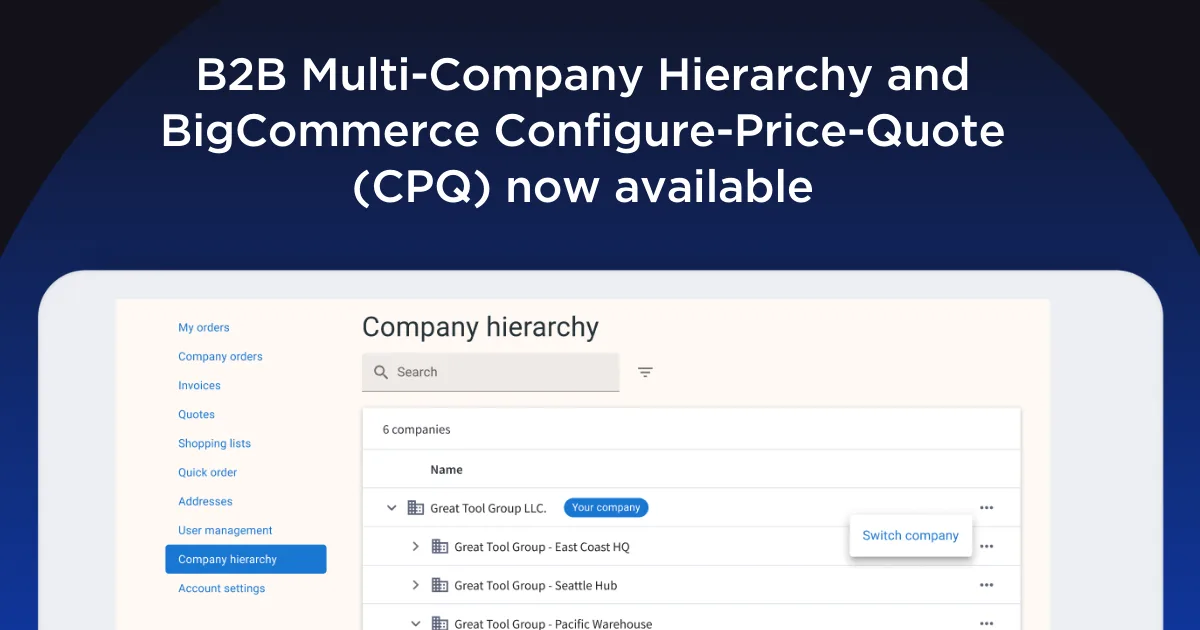BigCommerce has significantly enhanced its B2B capabilities in 2025, positioning itself as a comprehensive solution for enterprise commerce needs. The platform now serves 62 of the Top 2000 online retailers, generating over $3.8 billion in combined ecommerce sales in 2024. Recent updates focus on operational efficiency, scalability, and revenue growth through advanced automation and enterprise-grade features.
Major 2025 Platform Updates
Configure-Price-Quote (CPQ) System
BigCommerce launched a comprehensive CPQ system in March 2025, designed to streamline complex B2B sales processes. The system includes:
- Mobile-optimized interface for sales teams working across devices
- Customizable fields to accommodate unique product configurations
- Real-time tax and shipping calculations for accurate pricing
- Automated quoting options to reduce manual effort
- Discount controls for flexible pricing strategies
- Cross-channel support for both B2B and B2C transactions
The CPQ system addresses the critical need to shorten quote-to-cash cycles, allowing sales teams to focus on relationship building and deal closure rather than administrative tasks.

Multi-Company Account Hierarchy and Advanced Permissioning
This enterprise-grade feature enables businesses to create complex organizational structures that mirror real-world buyer relationships:
- Multi-tier organizational support for complex corporate structures
- Role-based access controls ensuring appropriate permissions
- Bulk invoice payment processing for streamlined financial operations
- Centralized branch management from a single interface
- Scalable account structures that grow with business needs
Core B2B Features Most Important to Enterprise Companies
1. Advanced Account Management
Company Account Hierarchy: Businesses can create sophisticated account structures reflecting their customers’ organizational complexity. This includes parent-child relationships, divisional structures, and regional hierarchies.
Role-Based Permissions: Granular control over user access ensures that procurement managers, approvers, and end-users have appropriate system access without compromising security or operational efficiency.
2. Pricing and Catalog Management
Custom Pricing Structures: Support for customer-specific pricing, volume discounts, contract pricing, and tiered pricing models. This flexibility is essential for B2B relationships where pricing often depends on purchase volume, relationship duration, and negotiated terms.
Catalog Customization: The ability to show different product catalogs to different customer segments, hiding or highlighting specific products based on customer type, region, or purchasing agreements.
3. Purchasing and Order Management
Bulk Ordering Capabilities: Streamlined processes for large-volume purchases, including CSV upload functionality, quick order forms, and automated reordering based on purchase history.
Shared Shopping Lists: Teams can collaboratively build and manage purchase lists, improving procurement efficiency and reducing duplicate orders.
Purchase Order Support: Native support for purchase order workflows, including approval processes and payment terms that align with B2B purchasing procedures.
4. Sales and Quoting Tools
Invoice Portal: Comprehensive invoicing capabilities that integrate with existing accounting systems, supporting various payment methods and terms.
Sales Rep Masquerade: Allows sales representatives to log into customer accounts to provide support, process orders, and manage customer relationships directly within the platform.
5. Integration and Scalability
ERP and CRM Integration: Seamless connectivity with existing business systems ensures data consistency and operational efficiency across the organization.
Multi-Storefront Management: Ability to manage multiple storefronts from a single backend, supporting different brands, regions, or customer segments while maintaining operational efficiency.
Headless Commerce Support: MACH (Microservices, API-first, Cloud-native, Headless) architecture provides flexibility for custom integrations and future-proofing technology investments.
Platform Architecture and Technical Capabilities
Open SaaS Architecture
BigCommerce’s open SaaS approach provides the flexibility of customization without the complexity of managing infrastructure. This architecture supports:
- API-first design for seamless integrations
- Extensible platform that adapts to unique business requirements
- Scalable infrastructure that grows with business needs
- Security and compliance built into the platform core
Mobile Optimization
All B2B features are designed with mobile responsiveness in mind, recognizing that modern B2B buyers expect seamless experiences across devices. This includes optimized interfaces for sales teams, procurement managers, and end-users accessing the platform from various devices.
Industry Impact and Competitive Positioning
Market Performance
The platform’s growth trajectory demonstrates its effectiveness in serving enterprise needs, with significant revenue generation among top-tier retailers. The focus on B2B capabilities reflects the platform’s commitment to serving the growing B2B ecommerce market.
Enterprise Adoption Trends
BigCommerce’s approach aligns with broader enterprise trends toward:
- Digital transformation of traditional procurement processes
- Unified commerce experiences across B2B and direct-to-consumer channels
- Operational efficiency through automation and integration
- Scalable solutions that support business growth
Enterprise customers highlight the platform’s ability to reduce administrative burden while providing the flexibility needed for complex B2B operations. The integration capabilities and customization options are particularly valued by organizations with existing technology ecosystems.
Future Outlook and Recommendations
For B2B Companies Considering BigCommerce
The platform is particularly well-suited for organizations that:
- Need to manage complex pricing structures and customer hierarchies
- Require seamless integration with existing ERP and CRM systems
- Want to unify B2B and direct-to-consumer operations
- Seek scalable solutions that can grow with their business
- Value customization capabilities without infrastructure management complexity
Strategic Considerations
Organizations should evaluate BigCommerce’s B2B capabilities against their specific requirements for account management complexity, integration needs, and growth projections. The platform’s strength lies in its combination of enterprise-grade features with the flexibility to adapt to unique business requirements.
AI-Powered Features: The Next Generation of B2B Commerce
BigCommerce has partnered with Google Cloud to deliver AI-powered solutions specifically designed for enterprise merchants. The platform’s AI capabilities include automated content generation, personalized storefronts, and advanced analytics that provide deeper business insights.
Key AI Features for B2B Operations
1. BigAI Copywriter
BigCommerce’s BigAI Copywriter, powered by Google Vertex AI, enables B2B businesses to generate SEO-focused product descriptions that increase search engine rankings while providing the detailed information B2B customers require. This is particularly valuable for businesses with extensive product catalogs where manual content creation would be resource-intensive.
2. AI-Powered Product Search and Discovery
Advanced AI algorithms analyze large product catalogs and customer purchase history to deliver more relevant search results. This capability is especially beneficial for businesses with “large SKU counts,” such as automotive parts distributors who may have millions of products. The AI can surface products customers are most likely to purchase, reducing search time and increasing conversion rates.
3. Intelligent Product Recommendations
AI systems understand complex product relationships and dependencies, enabling sophisticated cross-selling and upselling. For example, AI can understand that specific HVAC components are interconnected and suggest related parts that humans might overlook, helping customers find all necessary components for their projects more efficiently.
4. Predictive Analytics and Forecasting
AI can analyze vast data to predict future demand for specific products or services by analyzing historical sales data and B2B market trends. This enables businesses to:
- Optimize inventory management with seasonal and regional sales projections
- Implement dynamic pricing strategies based on demand patterns
- Identify customers at risk of churning for proactive re-engagement
- Highlight frequently co-purchased products to increase average order value
5. Personalized Customer Experiences
AI segments B2B customers into distinct groups based on several data points, analyzing big data to identify patterns, anticipate customer interactions, and deliver tailored content and product recommendations. Research shows that 49% of B2B decision-makers selected the ability to personalize the customer experience as a top reason for choosing a search solution with AI capabilities.
6. AI-Enhanced Customer Service
AI-powered chatbots provide 24/7 self-service support, trained on company product catalogs and customer service history to answer questions, resolve issues, and recommend products. This frees human representatives to handle more complex customer needs.
7. Automated Account-Based Marketing (ABM)
AI optimizes account-based marketing by identifying target accounts showing buying intent, analyzing their behavior, and suggesting engagement strategies. This ensures marketing and sales efforts focus on high-value accounts for higher conversion rates.
Implementation and Integration Benefits
Operational Efficiency Gains
AI tools can automate time-consuming and repetitive tasks, giving employees time to create more strategic workflows. This includes generating product descriptions for extensive catalogs and automating ERP system functions through AI-written scripts.
Enhanced Decision-Making Capabilities
AI can sift through historical sales data, customer behavior, and product information to identify trends that help make informed decisions, including determining the most profitable products, optimal customer targeting times, and potential supply chain bottlenecks.
Scalability Across Enterprise Operations
AI enhances the speed and accuracy of tasks involving large datasets, enabling businesses to scale operations efficiently while maintaining quality and precision in customer interactions.
Market Adoption Trends
90% of ecommerce businesses (including B2B) have either implemented or plan to implement AI by the end of 2025, indicating widespread recognition of AI’s transformative potential in B2B commerce.
Challenges and Considerations
Data Quality and Integration
While AI offers significant benefits, businesses must ensure data quality and proper system integration to maximize effectiveness. AI outputs require human oversight to validate accuracy and relevance.
Change Management
Organizations may face internal resistance to AI adoption, particularly in relationship-driven B2B environments. Success requires strategic implementation starting with lower-risk tasks and gradually expanding AI responsibilities.
Customization Requirements
B2B buyers have complex, unique needs that require sophisticated AI customization rather than one-size-fits-all solutions. The AI must handle complex pricing models, extensive catalogs, and multi-departmental decision-making processes.
Conclusion
BigCommerce’s 2025 B2B enhancements represent a significant evolution in enterprise ecommerce capabilities, now enhanced by comprehensive AI integration. The platform successfully addresses the complex needs of B2B organizations while maintaining the flexibility and scalability required for modern digital commerce.
The integration of AI capabilities—from automated content generation and predictive analytics to personalized customer experiences and intelligent product recommendations—positions BigCommerce as a forward-thinking solution for the Intelligence Age. With its focus on operational efficiency, advanced automation, comprehensive integration capabilities, and cutting-edge AI features, BigCommerce provides enterprises with the tools needed to compete effectively in an increasingly AI-driven marketplace.
The combination of proven market performance, continuous innovation, enterprise-focused features, and strategic AI implementation makes BigCommerce a compelling choice for organizations looking to transform their B2B ecommerce operations and harness the power of artificial intelligence for competitive advantage.
